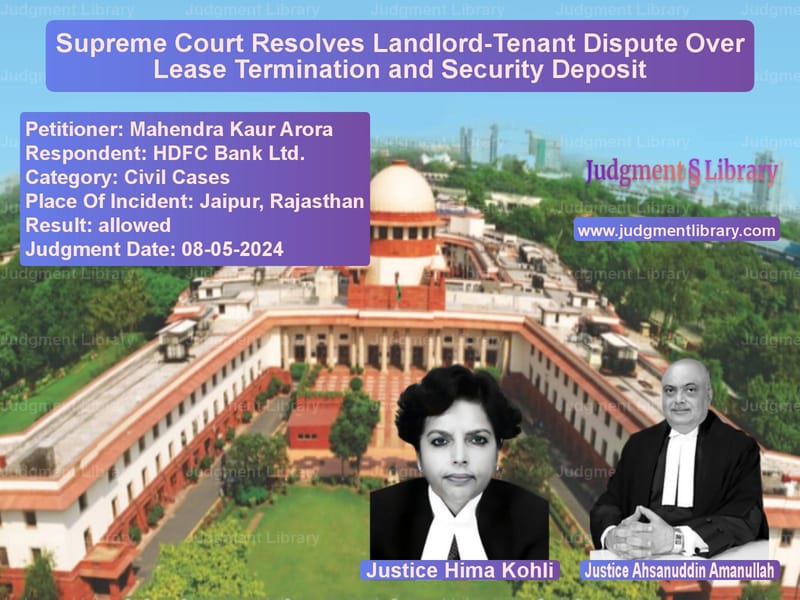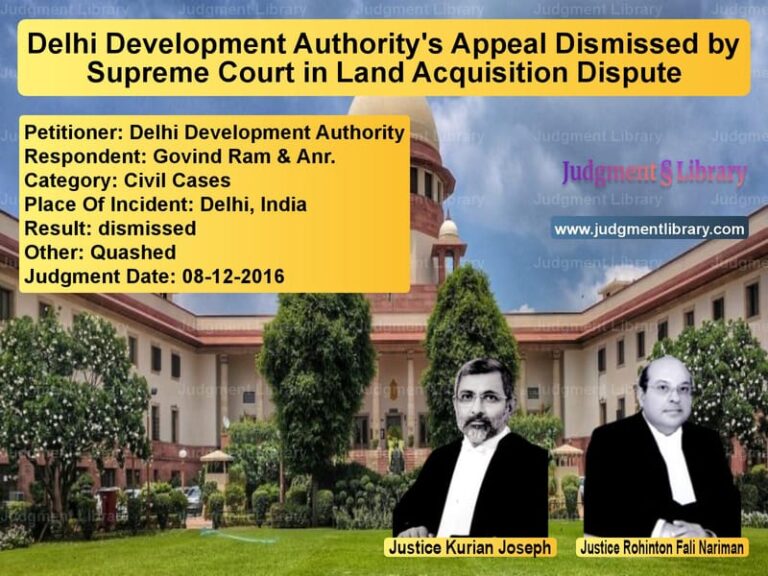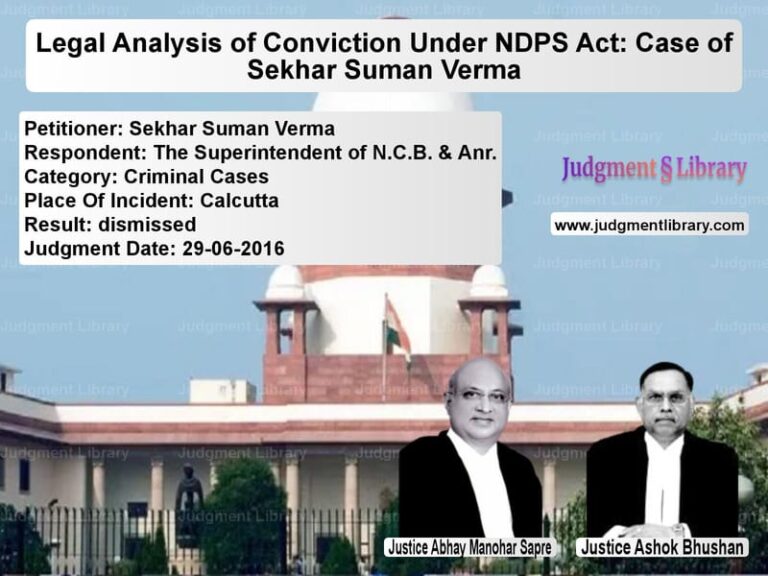Supreme Court Resolves Landlord-Tenant Dispute Over Lease Termination and Security Deposit
The legal dispute between Mahendra Kaur Arora vs. HDFC Bank Ltd. revolved around a lease agreement, the obligations of a lessee upon termination, and the rights of the landlord to claim rent for continued possession of the premises beyond the agreed period. The case raised significant questions regarding lease termination, possession, and financial obligations tied to security deposits.
The Supreme Court of India, in its judgment dated May 8, 2024, ruled in favor of the appellant-landlady, Mahendra Kaur Arora, setting aside the prior rulings by the High Court and the Appellate Rent Tribunal. The decision reaffirmed the principle that a tenant cannot continue to occupy premises indefinitely by citing a pending refund of the security deposit as justification.
Background of the Case
The dispute stemmed from a lease agreement dated October 13, 2000, between the appellant-landlady and the respondent, HDFC Bank Ltd., for a commercial property located at Vashistha Marg, Raja Park, Jaipur. The lease agreement stipulated that the premises were leased for a period of nine years with an agreed monthly rent of ₹28,625. The agreement contained specific clauses regarding lease termination, subletting, and security deposit obligations.
On May 10, 2004, the respondent-bank issued a formal notice of termination of the lease, in accordance with the agreement’s terms, effective from August 16, 2004. However, despite the formal termination, the bank failed to vacate the premises and continued occupying it until June 18, 2006, when possession was finally returned to the landlady.
Landlady’s Claims and Initiation of Legal Proceedings
The appellant contended that:
- The respondent-bank remained in possession of the premises beyond the notice period and refused to vacate on time.
- The bank did not pay use and occupation charges from August 16, 2004, to February 20, 2006.
- The security deposit of ₹85,875 had already been adjusted for three months’ rent.
As a result, the appellant approached the Rent Tribunal, Jaipur City, Jaipur, on February 20, 2006, seeking an eviction order and recovery of outstanding rent.
Response from HDFC Bank
In response, the respondent-bank filed a counterclaim, arguing that:
- Under the terms of the lease agreement, the security deposit was to be refunded at the time of handing over the premises.
- Since the landlady failed to return the security deposit, they were entitled to occupy the premises without paying rent.
- They were also entitled to 24% annual interest on the security deposit until the amount was refunded.
The bank relied on clauses 6 and 8 of the lease agreement, which allowed them to withhold possession until the security deposit was refunded.
Judgment of the Rent Tribunal
On April 10, 2008, the Rent Tribunal ruled in favor of the appellant-landlady, decreeing that:
- The bank was liable to pay rent for the period during which it retained possession.
- The counterclaim of the bank for a refund of the security deposit with interest was rejected.
- The landlady was entitled to recover rent for the unpaid duration.
Appeal Before the Appellate Rent Tribunal
Unhappy with the decision, the bank approached the Appellate Rent Tribunal, which on March 5, 2009, ruled in favor of the bank, overturning the decision of the Rent Tribunal. The appellate court held that the landlady was obligated to refund the security deposit before demanding possession.
High Court Proceedings
The landlady, dissatisfied with the ruling, moved the Rajasthan High Court under Article 227 of the Constitution. However, the Single Judge Bench upheld the decision of the Appellate Rent Tribunal on January 9, 2012. The landlady then filed an intra-court appeal, which was dismissed on July 30, 2015, as not maintainable.
Supreme Court’s Ruling
On appeal to the Supreme Court, the key issues considered were:
- Whether the bank was justified in continuing occupation without rent.
- Whether the refund of the security deposit was a precondition for vacating the premises.
- Whether the landlady was entitled to compensation for unauthorized occupation.
The Supreme Court ruled in favor of the landlady, holding that:
“There is nothing on record to demonstrate that any steps were taken by the respondent-Bank calling upon the appellant-landlady to remain present at the premises for handing over possession.”
Further, the Court noted that the lease agreement required the bank to vacate the premises before the security deposit was refunded. The ruling emphasized that:
- Tenants cannot unilaterally extend occupation due to a pending security deposit refund.
- The landlady was justified in demanding rent for the period of unauthorized occupation.
- The Appellate Rent Tribunal and High Court had erred in allowing the bank’s counterclaim.
The Supreme Court reinstated the April 10, 2008, Rent Tribunal order, dismissing the bank’s claims.
Conclusion
The judgment reaffirmed that a lessee must adhere to the lease terms and cannot refuse to vacate on the pretext of a pending security deposit refund. It provides clarity on the obligations of landlords and tenants, ensuring that landlords are not deprived of rent due to a lessee’s non-compliance.
Petitioner Name: Mahendra Kaur Arora.Respondent Name: HDFC Bank Ltd..Judgment By: Justice Hima Kohli, Justice Ahsanuddin Amanullah.Place Of Incident: Jaipur, Rajasthan.Judgment Date: 08-05-2024.
Don’t miss out on the full details! Download the complete judgment in PDF format below and gain valuable insights instantly!
Download Judgment: mahendra-kaur-arora-vs-hdfc-bank-ltd.-supreme-court-of-india-judgment-dated-08-05-2024.pdf
Directly Download Judgment: Directly download this Judgment
See all petitions in Landlord-Tenant Disputes
See all petitions in Damages and Compensation
See all petitions in Contract Disputes
See all petitions in Judgment by Hima Kohli
See all petitions in Judgment by Ahsanuddin Amanullah
See all petitions in allowed
See all petitions in supreme court of India judgments May 2024
See all petitions in 2024 judgments
See all posts in Civil Cases Category
See all allowed petitions in Civil Cases Category
See all Dismissed petitions in Civil Cases Category
See all partially allowed petitions in Civil Cases Category







